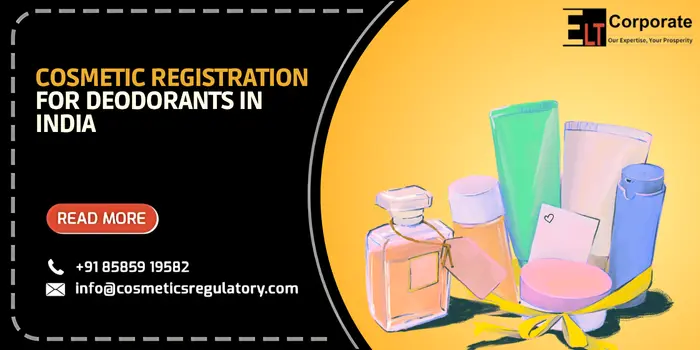The demand for deodorants and body sprays in India has increased rapidly due to changing lifestyles and personal hygiene awareness. However, before any deodorant can be imported, manufactured, or sold in India, it must comply with the Cosmetic Registration requirements set by the Central Drugs Standard Control Organisation (CDSCO).
Understanding the process of Cosmetic Registration for Deodorants in India assures that the product meets all safety standards before reaching consumers.
What is Cosmetic Registration for Deodorants in India?
Under the Drugs and Cosmetics Act of 1940 and the Rules of 1945, CDSCO oversees the regulatory procedure for cosmetic registration of deodorants in India. It guarantees that all deodorants produced in India or imported are safe, appropriately labelled, and devoid of dangerous substances. It entails obtaining formal CDSCO clearance before importing or selling deodorants in India.
Why is Cosmetic Registration for Deodorants in India mandatory under CDSCO regulations?
Cosmetic Registration was mandated by CDSCO to guarantee:
- Safety: The chemicals used in deodorants are safe for skin and health.
- Quality Assurance: Only products that meet Indian standards are allowed for sale.
- Protection of consumers: Prevents the sale of counterfeit, contaminated, or subpar products.
Which authority Governs Cosmetic Registration for Deodorants in India?
The Central Drugs Standard Control Organisation (CDSCO), under the Ministry of Health and Family Welfare, is the main authority.
| S.No. | Function | Description |
|---|---|---|
| 1. | Regulatory Authority | Grants approval for cosmetic import and registration. |
| 2. | Inspection | Ensures imported deodorants meet labelling and safety norms. |
| 3. | Monitoring | Keeps track of product quality and post-market compliance. |
Who can apply for Cosmetic Registration for Deodorants in India?
- A firm from India is producing deodorants locally.
- An authorized importer represents a foreign manufacturer.
- A foreign deodorant company’s Indian agent or subsidiary.
- As a certified regulatory consultant, ELT Corporate manages brand applications and documentation.
It should be noted that international trademarks must appoint an authorized Indian agent with a valid Import-Export Code (IEC).
What are the Documents required for Cosmetic Registration for Deodorants in India?
Applicant & Authorisation Documents
- Power of Attorney (authorising the Indian agent to act on behalf of the foreign manufacturer)
- Covering Letter on company letterhead
- Import Export Code (IEC) Certificate
- Authorisation Letter (if submitted by consultant or third party)
- Details of the authorised Indian agent (with contact and address proof)
Manufacturer’s Documents
- Manufacturing License or equivalent certificate issued by the concerned authority in the country of origin
- Good Manufacturing Practice (GMP) Certificate (as per Schedule M-II or ISO 22716)
Product-Related Documents
- List of products applied for registration (brand name, variants, and product type)
- Specification and testing methods for raw materials and finished products
- Free Sale Certificate (FSC) issued by the regulatory authority of the country of origin
Packaging and Labeling Documents
- Sample labels for each product variant
Technical and Supporting Documents
- Declaration of compliance with BIS or relevant international standards
- Toxicological data or safety test reports (if required for specific ingredients)
- Copy of previous CDSCO registration certificate (if renewal or modification)
- Soft copy of the complete application dossier (CD or pen drive format)
Additional (for Imported Deodorants Only)
- Importer’s address proof and warehouse details in India
- Copy of Bill of Lading / Airway Bill (for sample shipments)
- List of countries where the product is already marketed or approved
What is the step-by-step process for obtaining Cosmetic Registration for Deodorants in India?
- Determine Product Type: In accordance with Schedule S of the Drugs and Cosmetics Rules, see if your deodorant is classified as a cosmetic.
- A local representative who is authorized to interact with CDSCO should be appointed if you are a foreign manufacturer.
- Get the application ready. Collect all of the paperwork, such as the ingredient list, GMP certificate, product formula, and free sale certificate.
- Send in Form COS-1: Send in your application and any supporting documentation via the SUGAM online portal in Form COS-1.
- Review by CDSCO: CDSCO examines and could ask for more details or clarification.
- Grant of Registration Certificate: The Import Registration Certificate (Form COS-2) is issued by CDSCO after approval.
What are the Labelling and Packaging Requirements for Deodorants under Cosmetic Registration in India?
- Name of the product and brand
- Name and address of manufacturer/importer
- Manufacturing license number
- Batch number and expiry date
- Country of origin (for imported deodorants)
- Directions for use and warnings (if any)
| S.No. | Label Element | Indian-made Deodorant | Imported Deodorant |
|---|---|---|---|
| 1. | Manufacturer name | Mandatory | Mandatory |
| 2. | Country of origin | Not required | Mandatory |
| 3. | Importer address | Mandatory | Mandatory |
| 4. | Language | English / Hindi | English / Hindi |
How can ELT Corporate help with Cosmetic Registration for Deodorants in India?
ELT Corporate is one of India’s best regulatory consultancies, specialising in CDSCO cosmetic registration.
- Expert guidance on CDSCO cosmetic regulations.
- Preparation and verification of documents.
- Online submission and follow-up with CDSCO.
- Assistance in label and artwork compliance.
- Support in renewal and post-approval compliance.
- 100% end-to-end support for both Indian and imported deodorant brands.
Can Imported Deodorants be Sold in India without CDSCO Registration?
No, selling imported deodorants without CDSCO cosmetic registration is illegal and can lead to product seizure or penalties.
Is a separate registration required for every deodorant fragrance?
Yes, each variant or fragrance requires a separate registration under CDSCO guidelines.



